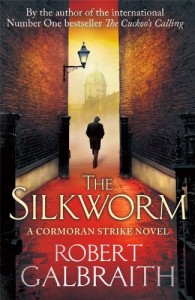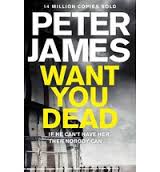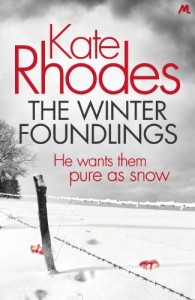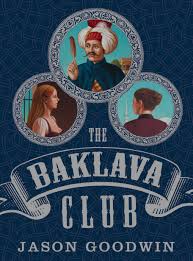 The Silkworm by Robert Galbraith published by Sphere UK, Mulholland Books US
The Silkworm by Robert Galbraith published by Sphere UK, Mulholland Books US
Carnal Acts by Sam Alexander published by Arcadia Books
Want You Dead by Peter James published by Macmillan UK, Minotaur US
The Winter Foundlings by Kate Rhodes published Mulholland UK, Minotaur US
The Baklava Club by Jason Goodwin published by Faber UK, Sarah Crichton Books US
When I reviewed The Cuckoo’s Calling in April Crime last year (under my own, rather than my crimewriting, name), I thought I’d been reading a first novel by a retired soldier. I thoroughly enjoyed it, particularly for the fun it offered and the charm of the relationship between the sleuth – big, hairy, wounded Cormoran Strike – and his quiet clever loyal assistant, Robin. Now that I know Robert Galbraith is the pseudonym of J. K. Rowling, it has been hard to read the second novel, The Silkworm, with the same innocence. I found myself reacting more critically, as though the contract between a first novelist and his reader is different from that between a reader and the biggest-selling writer of all time. Recapturing the innocence is impossible.
Once again I have enjoyed the relationship between Strike and Robin, particularly during a dramatic, snow-blanketed drive to the West Country. And once again it seems more important than the plot. This one concerns the disappearance of Owen Quine, an unpleasant author of overwrought and not very successful novels, whose downtrodden and incompetent wife commissions Strike to find him. The hunt involves Strike’s progress through an infernal world of jealous writers, even more jealous would-be writers, neurotic and alcoholic publishers, and bullying literary agents. Along the way, Galbraith raises interesting questions about authorship and identity, parody and the ownership of ideas. The novel’s title refers both to Quine’s theory that writers are like silkworms and to various characters’ interest in Jacobean revenge dramas. Silkworms figure as metaphors in the work of John Webster, who, along with his peers, has provided the epigraphs that head each chapter.
The Cuckoo’s Calling was well reviewed before its writer’s identity was revealed, but sold only modestly in print, although not, apparently, in the audio version. After the revelation it shot to the top of the print bestseller lists as well. If, as expected, The Silkworm does the same, it will disprove one piece of old trade lore: novels set in publishing never sell.
J. K. Rowling is not the only novelist to choose to write secretly under another name. This month sees the publication of Carnal Acts by ‘Sam Alexander’, described by her/his publisher as ‘the pseudonym of an acclaimed British crime writer’. The press release accompanying the review copy invites critics and other readers to guess who Sam Alexander is. I have no intention of doing so because of the importance of an innocent reading. Carnal Acts is a sex-and-sadism romp, masquerading as a police procedural novel about the fight between the Northumbrian force, Albanian organized criminals, and some unconvincing aristocrats. There is a potentially gripping crime novel buried here, but it is marred by the excessive sex and violence, too many subplots, over-detailed biographical asides, and the kind of research that allows ‘Sam Alexander’ to believe that there are still dog licences in the UK: ‘There’s no point going through the dog licence archive because, a) not every bugger buys a licence and, b)there’s no record of training.’ ‘Alexander’ also believes that English viscounts prance about the countryside with their family crests on their rain hats.
Sex and sadism feature in Peter James’s latest novel featuring Roy Grace, Want You Dead, but this is no romp, and James’s research into both police procedure and domestic violence is impressive. His portrait of a woman trying, with great difficulty, to believe she deserves to be free of her abuser is effective. He also tackles a subject that has often  seemed taboo: the sexual abuse of boys by their mothers.
seemed taboo: the sexual abuse of boys by their mothers.
Kate Rhodes takes her agreeable psychologist Alice Quentin to Northwood high-security hospital in The Winter Foundlings. Quentin is supposed to be carrying out research when she becomes involved in the manipulative games of an inmate. Louis Kinsella has been locked up for years after a series of atrocious killings of children. Now more children are being tortured and killed with the same modus operandi and, in the way of brilliant psychopaths dealing with young investigators in crime fiction, Kinsella holds out the promise of information if Alice behaves as he wishes. Her incentive to humour him lies the kidnap of one particular young girl, who may be saved if Alice makes Kinsella talk in time.
particular young girl, who may be saved if Alice makes Kinsella talk in time.
After all this brutality, it is a delight to fall upon Jason Goodwin’s last novel about Yashim, the eunuch detective of Ottoman Istanbul. Set in the 1840s and beautifully written, The Baklava Club does not entirely eschew sex or violence, but is restrained in both. This is a highly civilized piece of intelligent entertainment, to be  cherished for its elegance.
cherished for its elegance.
